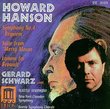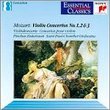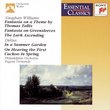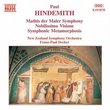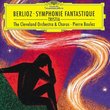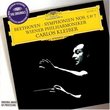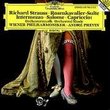Yes, but.
Joel Rafi Zabor | Brooklyn, NY United States | 09/27/2000
(4 out of 5 stars)
"Yes, but this set isn't a patch on the great, furious set of the Bartoks that the Juilliard recorded in the Sixties, which for some reason Sony hasn't seen fit to reissue on CD. By comparison the available set is polished, yes, but also static and both rhythmically and expressively deficient.
By the way, both Juilliard sets, and the Emerson, are very "American" readings of this music, which is to say architectonic and abstract--a distinct virtue when it's done as brilliantly as the Sixties set--whereas European quartets like the Takacs and the Vegh give you a very different, and probably more idiomatic, rendering. I'd want one of each type, and I haven't stopped hoping that one day Sony will reissue what may be the single greatest recording of the Bartok Quartets, the Sixties Juilliard, the one I grew up on and haven't gotten tired of yet. But those LP's are badly worn by now.(Since writing this, I've replaced them with the 3-CD set on Retrospective Recordings, as far as I know available only in the UK. That and the Takacs set on Decca are enough for me.)"
Doesn't compare to the 1963 Juilliard version
chefdevergue | Spokane, WA United States | 11/10/2003
(3 out of 5 stars)
"It is a shame that the 1981 Juilliard cycle has been the only available Juilliard cycle for some time, because it is by far the weakest of the three. Sure, it is a relatively cheap CD set, but I don't really feel it is worth the money. The playing, compared to the Juilliard's incomparable 1963 recording, is positively anemic. The sound quality also leaves a lot to be desired. Overall, this is an unsatisfying listening experience.If you want the 1963 Juilliard version, good luck. It is available only as an import, and is generally a challenge to acquire. The same can be said of the Alban Berg Quartett cycle. Probably the best domestically available version would be the Emerson Quartet's cycle.Some people may be thinking that they are getting the 1963 version with this CD set. Don't be fooled --- this version is significantly inferior and should definitely not be your first choice."
A neoclassical reading at a bargain price
R. Hutchinson | a world ruled by fossil fuels and fossil minds | 08/15/2001
(4 out of 5 stars)
"Bartok composed the great string quartet cycle of the early 20th century. Of the various available recordings, this Juilliard from 1981 has one obvious advantage -- it's cheaper. By all means, listen, it's a fine version, but you'll never know what you're missing if you don't hear the Takacs Quartet's "gypsy" version! The 3rd, 4th, and 5th quartets are sheer modernist genius. The 1st and 2nd are less innovative -- the 1st is in the romantic tradition. The 6th is calm and tragic, written as Bartok prepared to leave Hungary for the USA. Here are some comparisons between the Juilliard and Takacs recordings -- an advantage of the Juilliard is that the quartets are in order, while the Takacs changes the order. The resulting disadvantage of the Juilliard is that #4 is split. The Juilliard has perfunctory liner notes, while the Takacs has superb, extensive liner notes describing each piece and how it was written. As for the music, these are very different interpretations. The Juilliard Quartet sounds quite neoclassical -- light, even thin, restrained, and emphasizing the ensemble more than individual lines. In dramatic contrast, the Takacs Quartet sounds rougher, earthier, "gypsy" -- they are heavier, thicker, more passionate, and sound more like four individuals playing together than a unified ensemble. So far, a matter of interpretation. Both are valid, and the differences highlight the rich potential of the scores. BUT, there is a serious problem with the Juilliard, and that is why I give it only 4 stars -- the recording seems to slight the bass end, with a faint cello. The Juilliard recording of Carter's quartets doesn't suffer from this problem, and so I have to conclude that the problem is in the recording, not the playing. The recording of the Takacs disc is superb and balanced, and is probably partly responsible for the sound of four distinct lines. If you enjoy these quartets, listen to the great string quartet cycle of the late 20th century by Elliot Carter!"
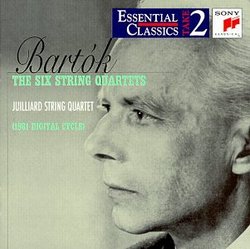

 Track Listings (11) - Disc #1
Track Listings (11) - Disc #1